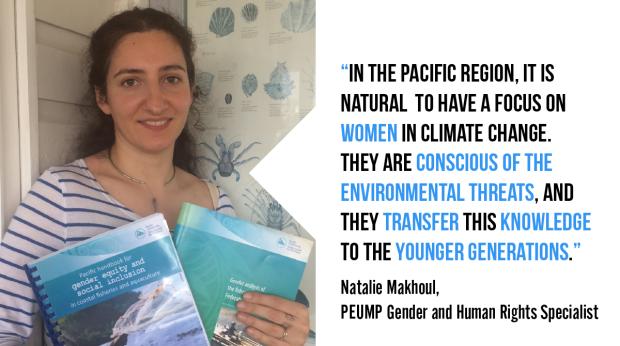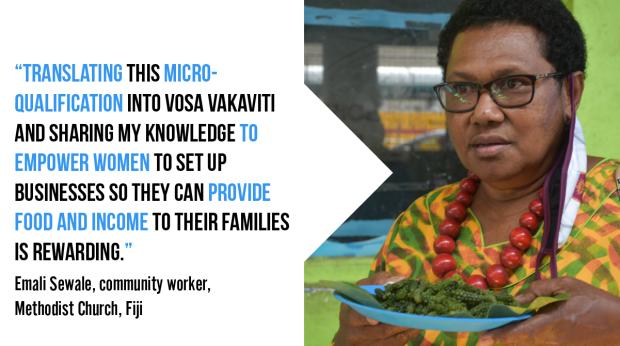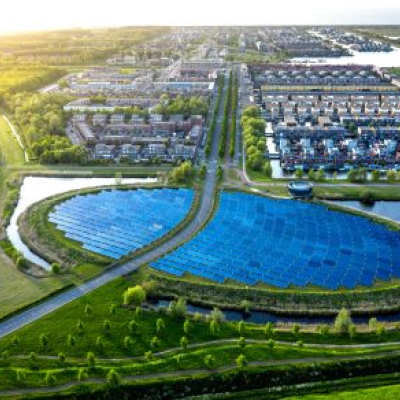The gender equality-environmental nexus came into international debate more than two decades ago. There remains, however, a lot to be done. The international community gathers to discuss how to achieve gender equality in the context of climate change policies and programmes. This article offers insights from one of the EU co-funded programmes mainstreaming gender across ocean and coastal fisheries management.
Climate change and environmental threats have strong gender dimensions. Women’s unequal access to and use of rights, resources, and opportunities make them more vulnerable to their natural environment1.
In line with the EU Gender Action Plan (GAP) III, the European Union is boosting a holistic incorporation of gender equality objectives across all environmental action, climate change and Disaster Risk Reduction policies and programmes. On theoccasion of the 66th UN Commission on the Status of Women, Capacity4dev highlights the EU co-funded programme Pacific-European Union Marine Partnership (PEUMP) as one of the flagship initiatives mainstreaming gender equality objectives in ocean and coastal fisheries management using a human-rights based approach.
Tips from the PEUMP to better integrate gender equality in environmental programmes:
Since 2018, the regional initiative PEUMP has been contributing to social, economic, and environmental development in 15 countries in the Pacific2.
How can this complex programme, implemented by key regional agencies3, inspire other development practitioners to jointly integrate better environmental and gender equality objectives?
- Design programmes which integrate a human rights approach with sustainably-allocated resources;
- Mobilise and strengthen the capacity of grassroots organisations for a sustainable impact;
- Implement a holistic approach to empower women and tackle social structures while considering local traditions.
1. Design programmes which integrate a human rights approach with sustainably-allocated resources.

PEUMP adopts a human rights-based approach with a strong focus on gender equality. Natalie Makhoul, PEUMP Gender and Human Rights Specialist, explains, “while designing and defining PEUMP, we counted on the comprehensive approach, network and knowledge of the programme’s implementing partners. Their expertise on gender and their capacity were crucial in integrating this knowledge into the specific areas covered by PEUMP.”
All the activities are guided by regional and country-specific gender, and social inclusion (GIS) analysis, conducted by PEUMP4 . The programme sheds light on the gendered use of - and access to - resources as well as the gendered division of labour in pre and post-harvest activities across marine spaces. PEUMP plans specific activities - informed by evidence - to mitigate primary concerns such as food security5, limited employment opportunities and poverty risks; all of which fall heavily on women due to their multiple roles, gendered forms of discrimination and bias, among others.

Adopting a gender lens from the design and inception phases, as well as planning sufficient resources for gender mainstreaming, was vital for PEUMP.
What is your experience in hiring gender experts for your programmes?
When designing PEUMP, the implementing partners also addressed the need to strengthen high quality, accessible, timely and reliable sex disaggregated data. Natalie Makhoul explains, “while conducting surveys, we are not only looking for quantitative data, but qualitative too. For this reason, we are cautious of the wording used. We need to ensure that questions are easily understood; that they catch the gender information needed.”
Natalie recognises that in order to be sustainable, it is crucial to have strong buy-in from partner institutions. Concerning PEUMP, the institutional support to implement this people-centred approach is supported by the commitment of the senior high-level management of all partner institutions involved and the allocation of specific resources. In her opinion, it is rare - but necessary - to appoint social science experts within the team, with the tasks and the budget, to fully implement a human rights-based approach while encompassing gender equality and women’s empowerment-focussed objectives.
2. Mobilise and strengthen the capacity of grassroots organisations for a sustainable impact.
The active mobilisation of grassroots civil society and human rights defenders in the Pacific, as well as of small-scale

informal businesses in rural areas, mainly run by women, is vital in order to raise awareness on what increasing gender equality can bring to the whole community. Emali Sewale, amongst the pioneers in obtaining the University of the South Pacific (USP) Micro-qualification in Establishing and Operating a Small Seafood Business6 , is now helping other Fijian women to learn the fundamentals of establishing and operating a small seafood business. Through funding by the Methodist Women’s Wing, Emali Sewale has been able to train 572 women from 14 provinces in the country. Six other division training courses were put on hold due to COVID-19 and extreme weather conditions.

PEUMP offer environmental experts who – while building capacity – teach an understanding of gender approaches through examples and sector-tailored guidance.
How do you ensure that everyone in your programme integrates a holistic gender approach?
“Most of the women that I have been training and teaching business skills live in far-flung coastal Fijian communities; their weakness is that, while they know how to catch, glean seafood and run a business, they do not meet the criteria to attend the USP course. Their geographical location and language barrier are major impediments. I see this gap as something I can fill, as my learnings from this micro-qualification are being shared to these women across communities in Fiji.”
However, not all CSOs, NGOs and government departments involved in the programme have yet the knowledge or the capacity to adopt a strong gender equality perspective in their activities. Therefore, PEUMP has developed a capacity-building component, which tackles specific issues within the coastal and aquaculture fisheries sector7. They are currently working on similar guidance material for the integration of gender in Pacific tuna industries. The Pacific Community (SPC) works with local CSOs and NGOs alongside governments. The objective is "to integrate the human rights approach to the community,” Natalie Makhoul explains, “we engage with them - spreading gender issues - through radio, leaflets and outreach activities like theatre in Vanuatu.”
3. Implement a holistic approach to empower women and tackle social structures while considering local traditions.

PEUMP support both better working conditions for women and the ability to have their voices heard.
How is your programme supporting active representation of women's voices in your sector?
Finally, removing barriers and strengthening the leadership and participation of women and girls is at the heart of the community work in PEUMP. Unfortunately, the Pacific is one of the least represented regions in the world for women in decision making. PEUMP identifies creative ways that allow women to speak up through different channels and to represent the community; ensuring their voices are heard, even if this means tackling the current patriarchal structure.
Georgi-Tai George-Akamoeau is a Fisheries Officer at the Cook Islands Ministry of Fisheries. She is one of the 11 female fisheries officers to graduate with the USP Certificate in Coastal Fisheries and Aquaculture Compliance.

More women “are taking on monitoring and surveillance roles, which is an important step in gaining more influence; moulding the women to be more confident with enforcement rules and continuing with the preservation of their traditional resources,” says Natalie Makhoul.
Georgi-Tai George-Akamoeau explains, “we must, as ocean sisters, break the glass ceilings to ensure that policies and legislation are followed to keep our Pacific Ocean pristine.”
Raoinaba Tarawariki is one of the two women from Kiribati with a USP micro-qualification in Establishing and Operating a Small Seafood Business. Despite being only 25, her family owns a small seafood company exporting dried fish and selling fresh, hygienic, and affordable seafood in Kiribati. She is also studying tourism to fulfil her dream, “I want to establish a unique eco-tourism attraction in Kiribati. A place to showcase our traditional customs, which is appealing for tourists from around the globe.”
Final thoughts

Women in fisheries play many roles which often remain unrecognised and undervalued due to the informal nature of their operation. According to Natalie Makhoul, PEUMP is working to provide decent working conditions for all men and women, to create a safer environment, and to facilitate market access through formalising support (e.g. certificates, private sector education support) while ensuring that resources are utilised in a sustainable manner.
“Boosting women’s employment should not be done only in economic terms. No matter if we are talking about women fishing in deep seas, gleaning or fishing within the reef, working in the tuna processing industry or selling fish at the market. The most important thing is to improve their working conditions holistically to tackle poverty, absenteeism, violence, harassment and lack of voice,” says Natalie Makhoul.
Learn more and read useful tips
To learn more about gender equity and social inclusion in fisheries and aquaculture click here.
To check Capacity4dev interactive content we recommend not to use Firefox browser.
Click on the play button below to watch our video about Pacific-European Union Marine Partnership (PEUMP).
|
How can the EU do more to promote a fair and inclusive green transition8
(i) capacity building for rural women; (ii) policy reforms to regulate land tenure more fairly and to manage natural resources and (iii) economic empowerment and access to finance;
|
Recommend this article if you think it will be helpful for your peers
Credit: Video © Capacity4dev | Photo © USP PEUMP Programme
1 For the last 25 years, this environment-gender nexus in policymaking has produced an extensive academic narrative and has become one of the priorities for the international community. Some of the research on this topic can be found in the OECD report “Gender and the Environment
Building Evidence and Policies to Achieve the SDGs” published in May 2021 or key UN conventions and agreements.
2 PEUMP is implemented in Fiji, Kiribati, Niue, Papua New Guinea, Tuvalu, Samoa, Timor – Leste, Cook Islands, Federated States of Micronesia, Nauru, Palau, the Marshall Islands, Tonga, the Solomon Islands and Vanuatu.
3 The implementing partners of PEUMP are the Pacific Community (SPC), the Pacific Islands Forum Fisheries Agency (FFA), the Secretariat of the Pacific Regional Environment Programme (SPREP) and the University of the South Pacific (USP).
4 These GIS analyses are fundamental to better understand the consequences of environmental degradation, climate change and disasters for Pacific women and girls, men, and boys and to know how it affects their lives which often depend on ecosystems' services for survival and livelihood.
5 Food security not as an exclusively women’s problem but integrated in the human rights-based approach in which the right to food and the right of livelihoods are linked to fisheries. More here.
6 The USP is one of four key implementing partners of the overall PEUMP Programme, and through this intervention is trying to build capacity through education, training, research and development for key stakeholder groups in fisheries and marine resource management in the 15 Pacific ACP Group of countries (P-ACP).
7 One of the tools developed by the PEUMP programme to enhance the capacity of partners is the publication of the “Pacific handbook for gender equity and social inclusion in coastal fisheries and aquaculture”.
8 Extracted from the EU Gender Action Plan (GAP) III – An ambitious agenda for gender equality and women’s empowerment in EU External Action page 20.






Log in with your EU Login account to post or comment on the platform.